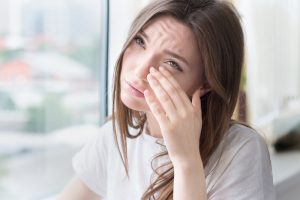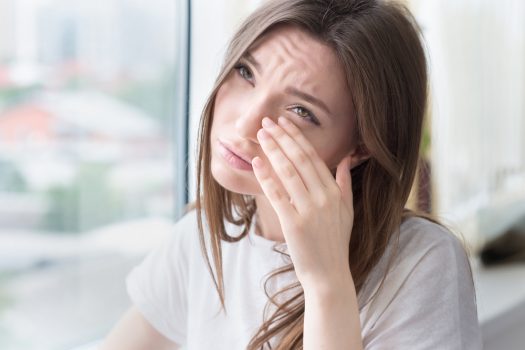What Is An Eye Allergy?
It is a widespread belief that allergies can make us sneeze, cough and lead to skin rashes but allergies can also affect our eyes. It can make the eyes watery, red, swollen and itchy. Eye allergies can also lead to conjunctivitis and other eye infections.
Eye allergies are very common, and it affects a vast number of people globally. Symptoms of eye allergies can be treated by the allergist, optometrist, or ophthalmologist. It usually does not harm the eyesight, but in rare cases, it can be extremely harmful to the eyes.

What Are The Causes Of Eye Allergies?
All kind of allergies, including eye allergies, occur when our body overreacts to an otherwise, harmless stimuli like pollen, dirt, grass, or a particular food. Our body produces antibodies to protect itself from infections. These antibodies lead to the production of histamine and other substances which in turn leads to itching and watering of the eyes.
What Are The Different Types Of Eye Allergies?
There are two types of allergies. Seasonal allergies occur during a particular time of the year and perennial allergies which can happen throughout the year.
- Seasonal allergies are caused by pollens present in the air which comes from trees and grass.
- Perennial allergies can be triggered by pet hair, feather, air pollutants, smoke, cosmetics, perfumes, dust present in furniture and mattresses, It can also be caused by certain foods and drinks.
What Are Symptoms Of Eye Allergies?
The main symptoms of eye allergies include:
- Inflammation of the conjunctiva as a reaction to allergens.
- Redness of eyes which is caused due to the swelling of the blood vessels present in the conjunctiva.
- Enlargement of blood vessels can also lead to swollen eyelids.
- Eye allergies can also lead to the secretion of excessive tears and other fluids.
What Are The Most Common Allergic Eye Conditions?
The most common allergic eye conditions are:
Allergic Conjunctivitis
It is the most prevalent form of eye allergy. It happens when the conjunctiva is inflamed due to the effect of an allergen. It mostly occurs due to the side effect of hay fever. When the conjunctiva is affected by allergy, then the mast cells produce histamine which leads to symptoms such as excessive secretion of tears and other fluids, swollen eyelids, itching and redness of the eyes.
Treatment
People prone to allergies are usually advised to avoid grass during the outbreak of hay fever. Doctors typically treat allergic conjunctivitis with the help of antihistamine in the form of topical eye drops. Oral medicines can also be given to stabilize the mast cells.
Atopic keratoconjunctivitis
This condition is a kind of conjunctivitis accompanied by dermatitis. It infects both cornea and conjunctiva. This kind of eye allergy makes the eyes very itchy, and it makes the skin of the eyelid turn red, dry and flaky. It can lead to substantial discharge and redness of the eye. This condition is quite painful, and people have the urge to rub and touch their eyes, but the rubbing of the eyes should be avoided as it can scar the cornea and lead to damage of vision. People with atopic dermatitis are prone to it. It affects more men than women.
Treatment
Doctors begin the procedure by finding the trigger of the allergy so that the patient can avoid it in future. Oral steroids can be given to relieve itching and discomfort. The doctor can also treat the patient with the help of antibiotics. Allergy shots can also be helpful in some cases.
Giant Papillary Conjunctivitis
This kind of eye allergy leads to the growth of large bumps on the conjunctiva, beneath the upper eyelid. It can also lead to redness and thick discharge from the eyes. This allergy is caused by the build-up of protein on the surface of the contact lenses. These allergies are triggered when the person is allergic to the contact lenses or the protein built-up on its surface. It happens when people sleep wearing the contact lenses. It also affects people wearing hard lenses instead of disposable ones.
Treatment
Doctors usually advise patients to stop wearing contact lenses if they develop this condition. But if it is necessary for the patient to wear it then the doctor prescribes to wear it for little time, proper cleaning and soaking the contact lenses in medicated solution is also recommended. If the condition persists then the doctor may give topical eye drops to relieve the condition.
How Can We Avoid Eye Allergies?
The best way to control eye allergies is to avoid the factors that trigger eye allergies. Dr. Durocher, a Nashville Eye Doctor, suggests wearing eyeglasses to protect the eyes from pollen and other allergens. Keeping the house dirt free and clean by mopping the floors, washing bed sheets, cushion covers and pillow covers frequently may also reduce the risk of eye allergies.

